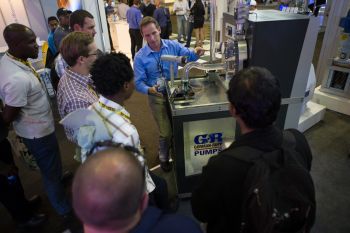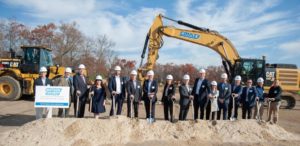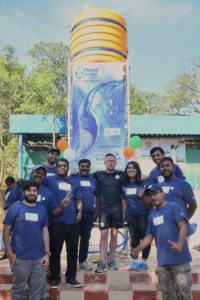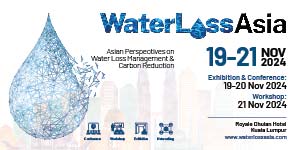IFAT Africa 2017: Finding Ways Out of the Water Crisis
From September 12 to 14, 2017, local and international representatives from the environmental sector will meet at the Johannesburg Expo Centre for the second edition of IFAT Africa.

IFAT Africa offers products and solutions specifically tailored to the African environmental market (Image: IFAT Africa)
The follow-up event to IFAT Environmental Technology Forum Africa, which took place for the first time in 2015, will focus on water, sewage, refuse and recycling. “The current water crisis is one of the most serious environmental problems facing Southern Africa,” says Stefan Rummel, Managing Director of Messe München. “With IFAT Africa, we offer a platform for discussing solutions to these problems and presenting the relevant technologies.”
The south of the continent has been suffering for many months from a severe drought, 2015 was the driest year in South Africa since weather records began in 1904. This further increases the pressure which is already on the water supply due to rapid population growth and continuing urbanization.
Making even greater use of surface water
Infrastructure development should assist in alleviating problems. As Germany Trade & Invest (GTAI) reported, the South African Department of Water and Sanitation has identified relevant projects with an investment volume of 2.7 trillion Rand (over €178 billion) to be carried out between now and 2035. The lion’s share of the projects will focus on greater use of surface water, which is already under considerable pressure. This will require, among other things, new dams, pumping stations, pipelines and treatment facilities.
South Africa’s neighbors also want to and must invest in their water infrastructure. Botswana, for example, is planning a pipeline project. By 2019, 1.4 billion Botswana pula (over €131 million) will be spent on improving the North-South Carrier which will pump water from the newly built Dikgatlong dam over 350 km as far as Gaborone, the capital city of Botswana.
Using groundwater
The groundwater reserves in Southern Africa will also play a key role in the future water supply. Namibia is currently carrying out research into the newly discovered Ohangwena II aquifer. If the planned development project goes ahead, it will create business opportunities for modern drilling technologies, special materials for deep wells and filtering systems. However, there are natural factors in South Africa and its neighboring countries which in many cases prevent making greater use of the groundwater. For example, the relevant reservoirs are often very deep and of a relatively poor quality which means that complex preparatory work needs to be carried out before they are used.
Desalinating seawater
The thirsting countries are also increasingly looking at the ocean. According to the GTAI, three complete feasibility studies for desalination plants for the South African cities of Cape Town, Durban and Port Elizabeth have already been submitted. In the longer term, desalination plants could provide around a tenth of the water supply in the Cape.
Namibia is also planning a modern desalination plant subsidized by the KfW Development Bank. A feasibility study will be produced by the end of 2018.
Reducing water losses
In addition to developing new supply channels, using precious water resources more economically and intelligently will be crucial. In South Africa, crumbling pipeline systems and illegal water extraction mean that huge amounts of drinking water are lost. In certain areas, 70 percent of the amount originally provided can be lost in this way. The country’s larger cities are therefore increasingly on the lookout for systems to detect leaks and for modern pressure management. This will also generate a need for new pumps, valves and water meters.
To prevent half of the water from evaporating in reservoirs, more water will be stored in future underground in Namibia. In years with heavy rainfall, surface water collected from the three-dam system will be stored in the Windhuk Aquifer so that it can then be used during periods of drought. According to GTAI, the “Windhoek Managed Aquifer Recharge Scheme” will cost around 700 million Namibian dollars (over €48 million) and will require drilling systems, pumps, pipelines, filtering systems, etc.
Reusing waste water
A further element in the combination of measures against drought in Southern Africa is the reuse of (partially) treated waste water wherever possible. Potential users of this service water include not only agriculture and industrial companies but also municipal institutions, offices and residential buildings. According to the GTAI’s observations, industry in Namibia is investing in water recycling systems with their own water treatment facilities, in part due to pressure from restrictions imposed by the state. And in South Africa, there will be promising business opportunities for small-scale treatment systems as part of decentralized structures.
Source: Messe München GmbH







